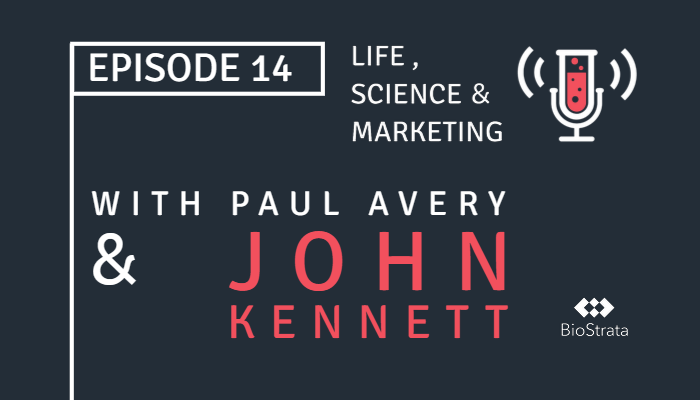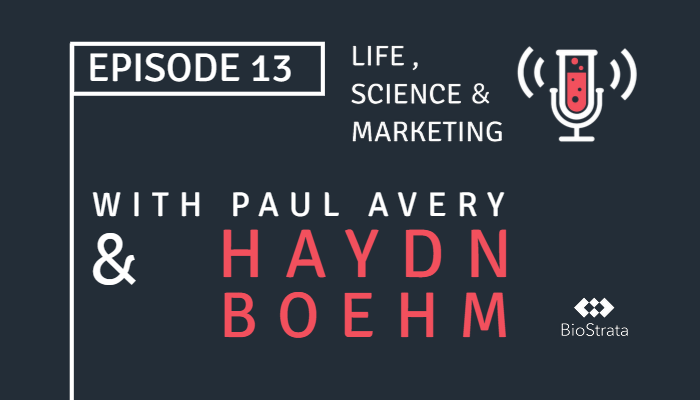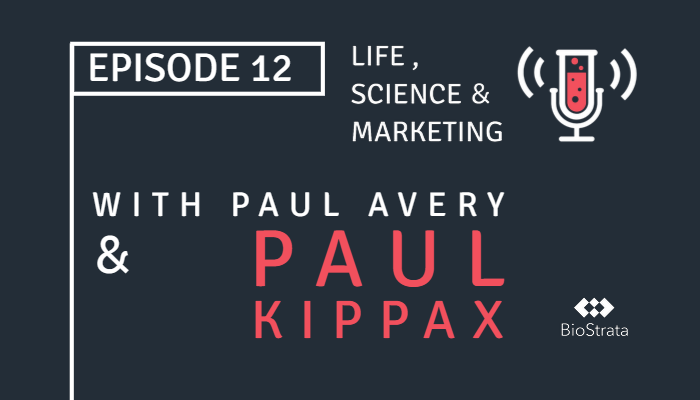Key takeaways from a special edition episode focused on debating life science marketing vs sales
Our "Life, Science and Marketing" podcast features revealing discussions between host and BioStrata CEO Paul Avery and accomplished professionals across the life sciences marketing landscape. Each episode offers insider perspectives on guests’ recommended marketing strategies and tactics, as well as their established career journeys.
In this special edition episode, Paul invited Nick Clare and Harrison Waid, co-founders of Succession, for a friendly beer and energetic debate focused on life science marketing vs sales ahead of the ELRIG Drug Discovery 2023 conference. Nick brings to the table a wealth of experience from the life sciences and drug discovery sector, having worked with pharmaceutical companies before shifting to commercial roles. He is currently serving as the Interim CBO at Definigen. Meanwhile, Harrison Waid's journey began in software sales, before pivoting to the biotech industry and ultimately life sciences. The conversation, flavoured with insights from sales, represented by Nick and Harrison, and marketing, championed by host Paul, delved into the distinct nuances and interplays of their respective fields.
Read on for a summary of the life science marketing vs sales debate episode and key takeaways from Nick, Harrison and Paul’s passionate and insightful conversation. You'll learn about friction points between marketing and sales teams, strategies to better collaborate, and the importance of aligning around shared revenue goals.
You can also listen to the full debate in the podcast episode below or find us on your favourite podcast platform. Let the life science marketing vs sales sparring begin!
The perception gap between marketing and sales
An early issue to arise in the debate was the perception gap that exists between marketing and sales in many organisations. From the sales perspective, there is a feeling that marketing doesn't truly understand the realities and challenges sales reps face in closing deals and generating revenue. Marketing is often viewed as removed from the day-to-day grind of selling.
At the same time, marketing feels that sales views them merely as a support function, rather than a strategic discipline. Marketing perceives sales as caring only about getting money and not interested in the broader importance of branding and positioning the business to ensure it is successful.
This perception gap appears to stem from lack of communication and knowledge sharing between the departments i.e. marketing and sales not fully appreciating the other's contributions creates friction. Increased transparency into day-to-day roles and responsibilities could help bridge this divide. Similarly, aligning metrics and fostering regular interdepartmental communication could encourage mutual understanding and collaborative goal-setting, thereby enhancing the overall synergy between marketing and sales teams.
Lead qualification terminology causes confusion
Another pain point between marketing and sales is confusion over lead qualification terminology. Terms like SQL (sales qualified lead) and MQL (marketing qualified lead) mean different things to different people. Past experience shapes how individuals interpret these labels, even if current definitions are clearly set.
For example, when marketing passes along what they deem an SQL, sales often disagrees and says the lead is not actually fully qualified. This understandably creates frustration on both sides (especially since marketing is often not in a position to determine whether a lead qualifies as an SQL, as their primary role is usually to generate MQLs.).
To address this terminology confusion, the debaters suggested a few strategies:
- It can be helpful in some instances for focus less on categorising leads and more on their level of intent and interest. Understand what action a prospect has taken (downloading a whitepaper, requesting a demo, etc.) rather than assigning a label.
- Where necessary, ensure unified, clear definitions for any terminology within an organisation. Get alignment from both marketing and sales on what constitutes an MQL versus an SQL, for example, and document the agreed definitions.
- Consider ditching qualification labels altogether in favour of more descriptive categories like "high intent lead" or "low intent lead" based on the actions they have taken.
Marketing content often lacks value for sales teams
Sales representatives often critique some of the content produced by marketing as not adding value from their perspective. For example, long, highly-polished case studies are difficult to utilise in customer conversations.
Instead, sales wants bite-sized content, key data points, and digestible nuggets they can easily convey over email or on sales calls. When case studies drag on for multiple pages, sales reps either won't read them or must distil them down themselves to be usable.
Recommendations for marketing included:
- Provide short snippets, summaries, and key details that sales reps can quickly reference rather than extensive case studies or whitepapers (which are great for marketing use cases, but not sales use cases).
- Tailor content specifically to align with the company's sales methodology and process. For example, create content that targets stages of the sales funnel or helps guide prospects through their buying journey.
- Lean on sales reps to provide feedback so marketing content consistently meets their needs.
Don't let customer issues distract sales
The debate in the episode touched briefly on an important consideration: should sales reps spend time following up on issues with existing customers? Or is this a distraction from their core role of landing new deals?
The perspective shared was that customer support issues should be handled by dedicated technical account managers or customer success teams. Allowing these concerns to occupy sales reps takes their time away from critical sales activities like prospecting and moving deals through the funnel.
While keeping customers satisfied is important, it's ultimately more efficient to have specialised roles own this post-sale relationship nurturing and support. Sales resources are usually better spent on delivering new revenue.
Strategies for marketing to gain credibility in sales-driven organisations
There are several tactics that marketing can leverage to build credibility and shake the perception of being just a support function within highly sales-driven companies, including:
- Partner with sales reps on initiatives to build trust and rapport. Collaborate on a campaign, content project, or workshop to showcase marketing's strategic value. Get sales bought into the process early.
- Closely align marketing messaging and content with the sales methodology used by reps. This makes it seamless for sales to leverage marketing's work in sales outreach and conversations.
- Focus messaging on business outcomes, results, and diagnosing customer challenges rather than purely on product features. Speak the language valued by both salespeople and customers.
- Establish a structured process for regular, high-quality feedback from sales to marketing. Use this conduit of insights to continually refine content and programs based on what's resonating for sales reps when they are "out in the field".
- Adopt internal communication frameworks like "sales is money today vs. marketing is money tomorrow" to sell the lasting value marketing brings, even if the impact on revenue takes time to build.
RevOps aligns sales and marketing goals
The debaters discussed the emerging RevOps function, which aims to break down silos and misalignment between sales and marketing. RevOps focuses on optimising and enhancing:
- Enablement programs to comprehensively train both sales and marketing teams, not sales alone. This develops a culture of learning.
- Operations, systems, and infrastructure to facilitate smoother cross-functional processes. For example, seamlessly passing leads from marketing to sales.
- Removing everyday friction points that waste time for sales, marketing, and their leaders. Automating manual busywork enables staff to focus on high-value activities.
- Overseeing the technology stack to ensure tools work cohesively across departments, while also identifying new technologies that can drive efficiency.
By unifying sales and marketing under one strategic leader, RevOps encourages enterprise-wide revenue thinking rather than finger-pointing between disparate departments. It enhances communication, ensures aligned goals, and makes both teams more efficient and effective.
Adopting a commercial team mentality
A key takeaway emphasised in the podcast episode was the importance of sales and marketing aligning around shared end goals. Often the departments operate in silos with misaligned objectives and incentives. This makes friction inevitable.
To combat this, the debaters suggested adopting more of a commercial team mentality where everyone focuses on overarching business and revenue goals rather than just sales or marketing goals. Other recommendations included:
- Don't relegate marketing to just a support function. View it as a way to reach customers at scale and build awareness.
- Eliminate finger-pointing or blaming between departments. Own goals collectively.
- Remove ego and remember everyone shares a common purpose - the company's success.
Uncover more insights with the Life, Science & Marketing Podcast
As we conclude this spirited debate between podcast host and BioStrata CEO Paul Avery and co-founders of Succession, Nick Clare and Harrison Waid, we want to thank our guests for sharing their candid perspectives and insights. You can connect with Nick and Harrison on LinkedIn or learn more about Succession's mission to support biotech sales professionals.
Stay tuned for future episodes of the "Life, Science and Marketing" podcast. We look forward to bringing you more lively discussions and practical advice on topics important to marketing and commercial strategy in the life sciences.
You can follow the podcast's official LinkedIn page for updates on new episodes and guest announcements.




